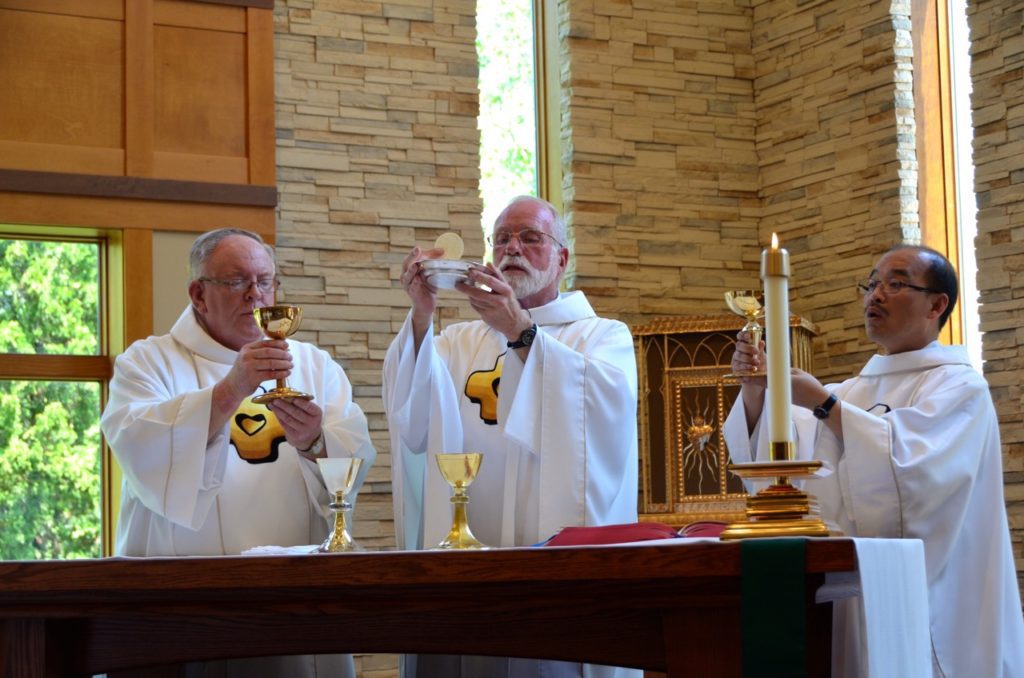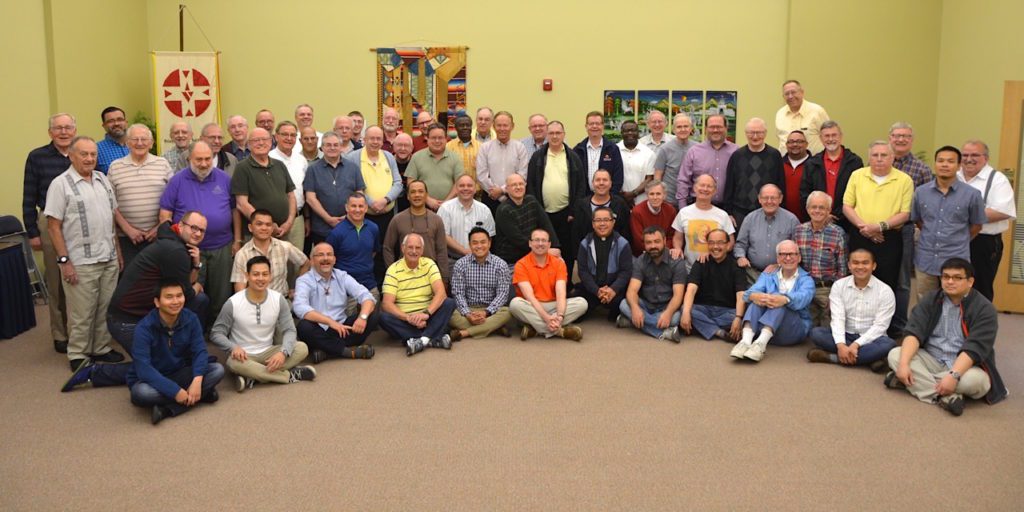
Click here to view an online photo album from the assembly
“Fellowship, prayer and substance”
“Fellowship, prayer and substance.” This is how organizers of the 2016 U.S. Province Assembly described the purpose of June 6-10 SCJ gathering held in Hales Corners, WI.
No elections, no administrative business, no statements to produce, no agenda other than to come together, in fellowship, for prayer and substance.
What was the substance? Certainly presentations around the theme of the assembly –– “The Dehonian Charism and the Year of Mercy” –– provided substance. But so too did times together on the golf course, in the chapel, around the dining table, walking the grounds. It was a time to come together in community as a community –– the most substantive thing of all.
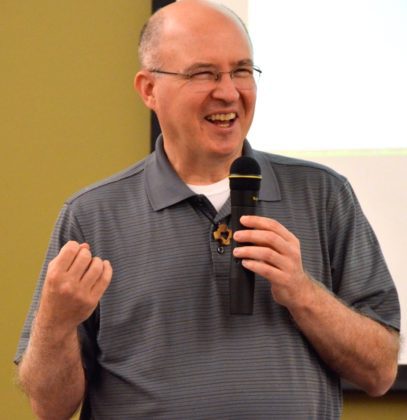
But of course, there were the presentations. The first was from Fr. Stephen Huffstetter, SCJ, former provincial superior and now general councilor. He spoke about the Six Year Plan of the new general administration, bringing it to life by sharing a bit about those who put it together: Fr. Heiner Wilmer, SCJ, superior general, and members of the General Council. He also briefly talked about the sectors for which he has responsibility, such as the social apostolate with the poor, education and culture, parishes, and youth ministry. He spoke of the emphasis the administration is placing on communication, enhancing its web presence and finding more ways to interconnect SCJs around the world. He encouraged the province to consider sending some of its members to international training programs that are being organized for treasurers and those in formation.
Fr. Steve said that the general visitation to North America would most likely take place in September, 2019.
Mercy in Fr. Leo John Dehon’s writings
Fr. John van den Hengel, SCJ, former vicar general and now superior of the Canadian Region, spoke about the word “mercy” (“miséricorde”) in the founder’s writings.
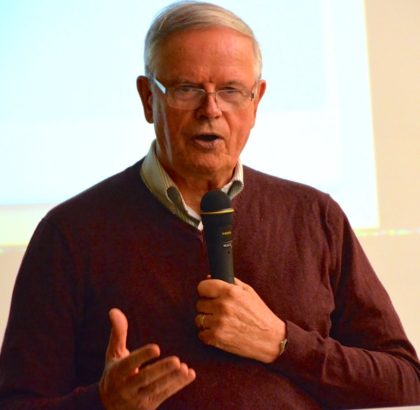
“Is mercy a sign of our time?” asked Fr. John. “I think that it is.”
“Mercy” was chosen as the theme of the 2015 General Chapter, and since then, Fr. John has written at least a half-dozen reflections on it. Yet he feels that he and others, including Pope Francis, who proclaimed the Year of Mercy, haven’t quite found sufficient language to really name what mercy fully is.
“Something keeps escaping us in trying to speak about mercy,” said Fr. John.
Mercy as forgiveness, as a pardon for sin, is one of the most frequently used concepts of mercy found in Fr. Dehon’s writings. God’s mercy changes a person from being a sinner to being in grace. Mercy is inexhaustible, infinite. Forgiveness is found in it, but mercy is more than forgiveness.
Fr. Dehon touches on the effect that mercy has on those who receive it. “Mercy makes possible the capacity in humans to be merciful to others,” said Fr. John. The founder was aware of the power of mercy, that it does not undo an act, but instead, lessens the force of it.
“Mercy is always in excess,” said Fr. John. “It is a summons to take care of the other.”
Mercy as related to reparation and our vows
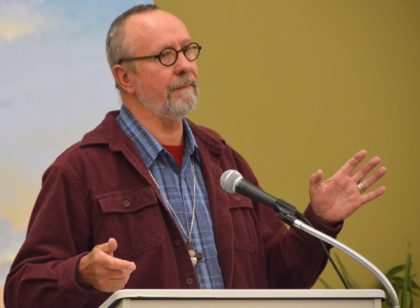
Fr. Byron Haaland, SCJ, spoke about mercy in relation to reparation and the religious vows of the Priests of the Sacred Heart.
“As Priests of the Sacred we are called by way of reparation and oblation to make the Church merciful,” said Fr. Byron. “This is not an option. It is our vocation, our call that drives us to go forth into the world.
He spoke about the SCJ Rule of Life. “When I saw it I said, ‘Oh my! The genius behind it,’” said Fr. Byron. It was obvious that its authors were inspired by Holy Spirit… How we as SCJs understand reparation is so simple, profound and challenging. Where it begins is with the welcoming to the Holy Spirit.
“Our SCJ Constitutions call us to collaborate in the work of redemption of the world.
“I’d like to reword that to say that we are called to collaborate in the work of mercy in the midst of the world.”
Mercy in regards to migration crises
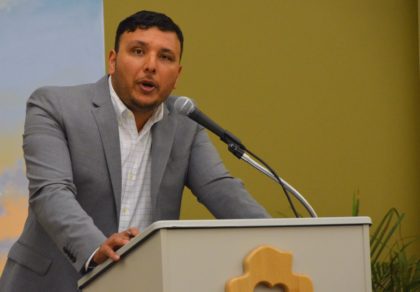
Dr. Grant Silva, assistant profession of philosophy at Marquette University, spoke about mercy in regards to the current migration crisis.
He gave a detailed background on the cause and effect of migration, especially migration across the borders of the United States, the desperation that compels many people to flee their homes, or to send their children on long journeys alone.
Migrants, both legal and illegal, should receive mercy, he said. Yet it is important that this mercy not be given out of a sense of forgiveness.
“Mercy as forgiveness should be reserved for us, those sinners who live with our First World privileges and yet do nothing to help our brothers and sisters that reside in horrendous conditions,” said Dr. Silva. “Mercy as compassion is the best approach to take, and we should be sure that our parishioners hear this when we advocate for it.”
In a Q&A session after his presentation Dr. Silva emphasized that “We exist in a social world. We have a modern concept of states as individual, self-enclosed, self-sustaining groupings. But our nation depends on the existence of other nations. We need labor and resources from other places.” Migration needs to be viewed through the lens of a global, interconnected world, not of one of borders and politics.
Mercy in our personal lives
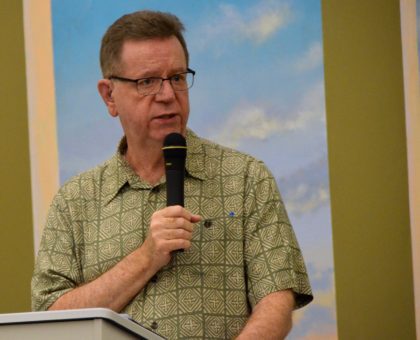
The final presenter on the topic of mercy was Fr. Paul Kelly, SCJ, who, reflecting on his own life, spoke about how we are personally touched by God’s mercy expressed through others.
“Community life has challenges in regards to mercy,” he said. “We come together for the mission, for the community. We are so very much alike and but also so very different. And that is the rub. How different we are! We unintentionally hurt with words, slights and misunderstandings. Sometimes we choose to wallow in hurt. Sometimes we choose in Divine Grace to forgive, to live in mercy. It is difficult.”
In facing challenges Fr. Paul said that he often uses a prayer that is attributed to Archbishop Oscar Romero:
“Lord, I can’t, you must, I’m yours, show me the way”
“When it comes to being merciful in community sometimes I say, ‘I can’t,’” said Fr. Paul. “But if we allow God to work in us, we can be shown the way; the way to give mercy, to receive mercy. I hope that we will continue to find deep experiences of the mercy and compassion that God intends for us to experience in and through the lives of one another.”
Conclusion
The assembly also included presentations by Kathleen Dahlgren (province attorney) on Power of Attorney documentation, and Mary Gorski (province communications) on resources available to SCJs on the internet.
Fr. Ed Kilianski, SCJ, provincial superior, was the main celebrant of the closing liturgy. It was a bilingual Mass in Spanish and English that included the “Our Father” in some of the many other languages of the province, including Indonesian, Vietnamese, French and Polish.
